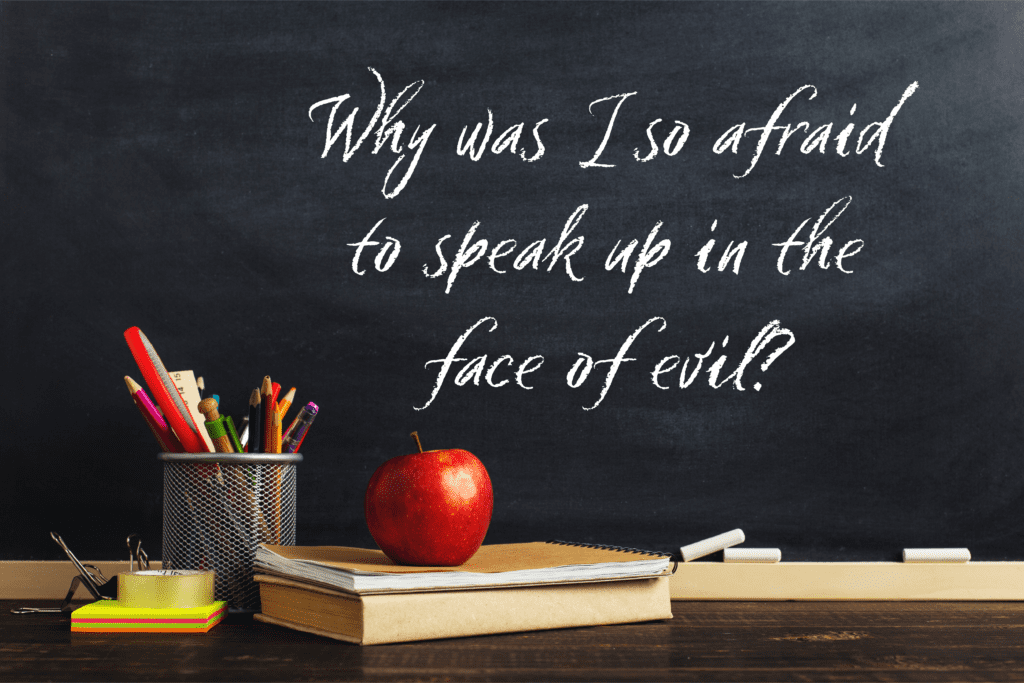
While discussing the moral climate of public schools at a recent workshop in Kentucky, a retired public school teacher lamented in tears – why was I so afraid to speak up in the face of evil? Sadly, this teacher represents too many good Christian men and women who pursued a public school teaching position for all the right reasons, but who quickly learned to self-censor their Christian convictions in the face of an ever-growing cancel culture. Today, the crisis of self-censorship manifests itself in the failure to prepare students as citizens with critical thinking and persuasion skills and contributes to the complacent attitude of many educators in public schools who simply hang on for retirement.
We Need Boldness not Self-Censorship
The biblical witness of early Christians demonstrates a different perspective. Those men and women knew that gospel proclamation included a thorough biblical worldview. This meant sharing the good news about God’s creation design, as well as the bad news of sin in a fallen world, and the ugly news of an enemy who seeks to beguile young people into the domain of darkness. Importantly, those early Christians proclaimed this good news not through angry confrontation but instead by what the English translation calls “boldness.” They displayed this boldness through confident and courageous speech that openly and unapologetically reasoned with and persuaded others about the truth of God. Perhaps that represents what Martin Luther King, Jr. meant when he wrote about the gospel as the hope for all generations in all areas of life:
“There was a time when the church was very powerful. It was during that period when the early Christians rejoiced when they were deemed worthy to suffer for what they believed. In those days the Church was not merely a thermometer that recorded the ideas and principles of popular opinion; it was a thermostat that transformed the mores of society.”1
Several years ago, while attending a training academy for Christian lawyers, a recognized Christian leader expressed concern about the results of Christian self-censorship in culture. As he lamented over the many moral failings evident in our culture, he concluded that the church had lost her voice of influence because the church simply had failed to show up and had failed to stand up, and had failed to speak up. He then looked out over the audience, emphasizing his last remarks by adding – ladies and gentlemen, we’re the church.
Today, the evidence is overwhelming that Christian self-censorship has contributed to catastrophic moral failure in our nation. For example, until recently, evidence suggested that a small percentage of youth identified with the LGBT lifestyle. Now, according to recent studies, over twenty percent of young people identify with the LGBT lifestyle. Moreover, a 2023 report suggests that the incidence of youth with “recent-onset discomfort with their sex,” i.e., those succumbing to the beguiling of gender ideology, has risen by 4,000 percent!2
This current manifestation of the sexual revolution represents a direct attack against the authority of Scripture and the image of God in the next generation. As Francis Schaeffer wrote in 1984:
“Make no mistake. We as Bible-believing evangelical Christians are locked in a battle. This is not a friendly gentleman’s discussion. It is a life and death conflict between the spiritual hosts of wickedness and those who claim the name of Christ. It is a conflict on the level of ideas between two fundamentally opposed views of truth and reality. It is a conflict on the level of actions between a complete moral perversion and chaos and God’s absolutes. But do we really believe that we are in a life and death battle?”3
At the Justice Defense Foundation of Kentucky, we understand that we are in a battle, and we believe that today’s moral issues represent gospel matters. This belief emphasizes the importance of speaking biblical truth confidently and courageously at every opportunity, whether at the dinner table, the coffee house, the schoolhouse, or the state house. As the Bible instructs in Ephesians 5:16, we are to make the best use of these opportunities “because the days are evil.” And if you’re wondering where to start, maybe start with something as simple yet profound as what Jesus said about gender clarity recorded in Matthew 19:4: Have you not read that He who created them from the beginning made them male and female?
To that end, Abigail Favale rightly reminds us in her thoughtful book The Genesis of Gender about how Jesus views gender:
[Jesus] appeals to cosmology, to the sacred narratives of Genesis that give an account of our identity and purpose as human beings. Genesis still speaks the truth about men and women, about who we are created to be. . . . He turns our eyes back toward Genesis and urges us, with divine help, to reclaim the goodness of the created order, the gift of our bodies and the earth, and to cultivate anew a dynamic of reciprocity between the sexes.4
In this way, Jesus exalts the dignity and value of every individual. Shouldn’t we as well?
1Martin Luther King, Jr., Letter from Birmingham Jail. 2Grossman, M. 2023. Lost in Trans Nation, p. xxviii. 3The Great Evangelical Disaster, pp. 31-31. 4Favale, A. (2022). The Genesis of Gender: A Christian Theory. Ignatius Press, p. 50.
